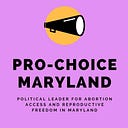Fetal tissue research restrictions are part of the anti-choice agenda. Here’s why.
by Krithika Pennathur
Since its conception, fetal tissue research has always been subject to strict laws and regulations. Anti-abortion activists have attacked these regulations, in hopes of making them stricter. Fetal tissue is often obtained through abortions, since tissue from miscarriages can be difficult to use.(1) In order to regulate fetal tissue research, anti-abortion legislators have found ways to limit the use of fetal tissue from elective abortions.(1)
Currently, five states have laws that bans all research on fetal tissue from abortions.(1) Indiana’s ban was highly publicized, as it requires the disposal of fetal tissue through cremation or in a cemetery, thus eliminating any possibility of donating it to research.(1)
This past legislative session, the Maryland General Assembly tried to pass a fetal tissue research prohibition bill, which bans obtaining fetal tissue from elective abortions for research purposes.(2) Additionally, this bill bans having incentives to obtain or to donate fetal tissue from elective abortions for research purposes.(2)
This bill is part of a growing movement to promote an anti-abortion agenda through science. Until recently, I didn’t recognize that severe regulations of fetal tissue research is intertwined with promoting the anti-choice agenda. For several decades, fetal tissue research has been controversial, and, with new regulations imposed by the Trump/Pence administration, fetal tissue research is going to be even more limited.
History of Fetal Tissue Research Policies
Scientists have been conducting fetal tissue research since the 1930s.(1) Fetal tissue can be altered and adapted to new environments, which makes it conducive to study many different diseases.(3) This research is vital in understanding chronic conditions and congenital diseases; it has helped eliminate polio, measles, and rubella in the United States.(1) It has also aided the development of vaccines, such as those for mumps and tetanus, and in transplantation research.(1) Fetal tissue research has also been instrumental to advancements in finding a HIV cure.(1)
Since the 1950s, the National Institutes of Health (NIH) always stood by fetal tissue research as an important pillar to advancing health and public policy. In 1974, Congress passed the National Research Act, creating a commission to develop ethical guidelines for research on human subjects, including fetal tissue.(1) In 1988, Reagan implemented restrictions on federal funding for fetal tissue research.(1) However, in 1993, they were overturned with bipartisan support through the NIH Revitalization Act. In several states, through the Uniform Anatomical Gift Act, there are regulations stating fetal tissue should be treated like any other human tissue.(1)
Regulations from the Trump/Pence Administration
Trump and Pence’s latest announcement restricting experiments involving fetal tissue from elective abortions is simply a way for them to push an anti-abortion agenda.(4) This included banning government scientists from conducting or using this material for research and imposed more regulations on the NIH grant proposals.(5)
The Department of Health and Human Services (HHS) has terminated several contracts with organizations that conduct and use fetal tissue research. In September of 2018, HHS terminated contracts between Advanced Bioscience Resources, Inc. and the Food and Drug Administration because they had been using fetal tissue from elective abortions to develop testing protocols.(4) HHS also ended a $2 million annual contract with the University of California, San Francisco (UCSF) that involved the use of fetal tissue.(4) At the time of the announcement, there were 200 external government-funded projects involving fetal tissue research that wouldn’t be affected.(6) This new policy affected three NIH projects, as they would be only allowed to continue their experience as long as fetal tissue was available, and all future projects with fetal tissue research.(6)
As for the rest of the scientific community, this policy has devastating impacts. Many scientists will have to rely on private funds to continue their research.(5) There are concerns that private funds are not always available and that not all private donors will be willing to fund fetal tissue research.(5)
Conclusion
As pro-choice activists, it is important for us to support fetal tissue research access in the abortion space. Everyone has a right to agency and bodily autonomy, including when they want to donate to scientific research. Furthermore, elective abortions shouldn’t be stigmatized by these fetal tissue research bans using a “scientific lens” to promote an anti-choice agenda. Without fetal tissue research, there will be a significant loss in scientific advancement and a setback for the pro-choice movement.
1. Boonstra H. Fetal Tissue Research: A Weapon and a Casualty in the War Against Abortion. Guttmacher Institute. https://www.guttmacher.org/gpr/2016/fetal-tissue-research-weapon-and-casualty-war-against-abortion.
2. 2020 MD HB734
3. FAQs on fetal tissue research. American Society for Cell Biology; 2015. http://www.ascb.org/wp-content/uploads/2015/10/fetal-tissue.pdf
4. Statement from the Department of Health and Human Services. HHS. https://www.hhs.gov/about/news/2019/06/05/statement-from-the-department-of-health-and-human-services.html.
5. Kwon D. Scientists Grapple with US Restrictions on Fetal Tissue Research. https://www.the-scientist.com/news-opinion/scientists-grapple-with-us-restrictions-on-fetal-tissue-research-67205.
6. Abutaleb Y. Trump administration moves to end U.S. research using fetal tissue from abortions. https://www.reuters.com/article/us-usa-health-fetus/trump-administration-moves-to-end-u-s-research-using-fetal-tissue-from-abortions-idUSKCN1T6251
